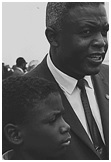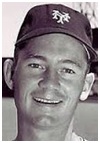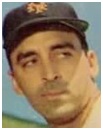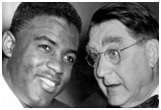|
 |
|
 |
|
|
||
Jackie Robinson - Leadership, Success and Assertiveness
Jackie Robinson (1919 – 72) African American baseball player.
Famous for...
For more detail see... The March on Washington in the History Highlights section.
Why was he a hero?
1. Purpose He wanted to help others, motivated by his belief in God. He told his mother: “A life is not important except in the impact it has on other lives”. He was particularly concerned by the exploitation of his fellow African Americans and helped their civil rights
struggle through his:
Robinson:
Robinson is pictured right at the march with his son. “Life is not a spectator sport”, he said.
2. Leading by example Robinson:
His Brooklyn Dodgers teammate, Pee Wee Reese (pictured right together in 1952), bravely came onto the field and famously put his hand around Robinson’s shoulder. For many people, it was the first time they had seen friendly physical contact between blacks and whites.
3. Self-control During his first two seasons, he quietly accepted the horrific physical and verbal abuse of his opponents. But, from 1949 onwards, his hot temper sometimes got the better of him For example, he severely injured Davey Williams of the New York Giants (pictured right) attempting to run over his teammate, Sal Maglie (pictured right below).
4. Courage and determination The title of Robinson’s autobiography, I Never Had It Made, reflects his life’s constant battles. He had to endure:
5. Support He received inspirational help from his:
6. Learning and assertiveness Particularly from his mother and grandmother, he learned the importance of
Key quotes on success Life is not a spectator sport. I won't 'have it made' until the most underprivileged Negro in Mississippi can live in equal dignity with anyone else in America.
Key quote on influencing people A life is not important except in the impact it has on other lives.
Black America has asked so little, but if you can’t see the anger that comes from rejection, you are treading a dangerous course (letter to Roland Elliott, President Nixon’s assistant)
|
|
|
||
|
|
||
| Copyright © wisdomtowin.com 2025 All Rights Reserved | ||
|













